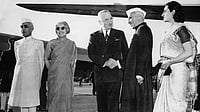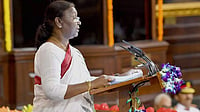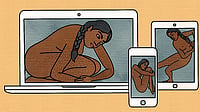As the Johnny Depp-Amber Heard defamation trial concluded earlier this month, we watched with vicarious pleasure the dramatic twists and turns unfolding in real time, the careers of celebrities and their attorneys being made and unmade in the courtroom. While it is nobody’s case that Heard’s private actions or public testimony were beyond critique, the extreme position taken by Depp’s fan clubs and supported by armies of online bots, that Depp could do absolutely no wrong, was clearly problematic and points to some uneasy fault lines in our societies. Here I look at some interesting legal dynamics of the case and its wider implications.
This case and its verdict—with both parties being found liable for defamation, but Depp being awarded a much larger sum of fifteen million dollars in damages compared to Heard’s two million, with the latter indicating she will appeal—have been publicly presented as a resounding victory for Depp and confirmation of his “objective” truth. In the process, the complex role of power in the legal process has largely been overlooked. Legal due process is a cornerstone of democracy; yet, as in the case of powerful nations calling the shots in the arena of international relations, power and clout play a critical role in the courtroom too. Particularly so in a defamation lawsuit, which in the United States is a civil suit. This is unlike in India where defamation can, pending legal reform, also be a criminal lawsuit, a relic of a colonial past that was historically used to silence critics of oppressive colonial regimes and has unfortunately been invoked in a postcolonial context to intimidate women coming forward with accounts of rape and sexual harassment in the workplace.

In other words, a defamation civil lawsuit in the US is different from a criminal lawsuit, an example of the latter being sexual assault. An obvious difference between civil and criminal offences—the latter including both felonies and misdemeanours—is that those convicted of a criminal offence may, depending on the case, be required to serve jail time unlike in a civil lawsuit, a point that those calling for Heard to be imprisoned seemed to be unaware of. The more important point is this: unlike a criminal case which is considered a crime against the state, where the public prosecutor represents the state on behalf of the victim/survivor who does not need to hire private counsel (the accused, known also as the “defendant,” does need to hire a defence attorney, with the exception of indigent defendants who are provided public defenders by the state), a defamation lawsuit begins with each party hiring their own legal counsel. While these attorneys are fully answerable to their private clients in a way that a public prosecutor is not answerable to victims of crime, giving clients more control, the economic clout of both parties plays an important role from the very beginning.
Unless one can secure pro-bono legal representation, this financial cost can act as a deterrent to many who cannot afford to sue for defamation given the money, time and sundry other costs. Thus the old adage that you need money to make more money clearly applies here.

One woman whose star rose as rapidly as Amber Heard’s went down was Camille Vasquez, whose tight and tenacious cross-examination played a huge role in securing a favourable verdict for Depp. Her skill as an attorney was apparent, for instance, when she pointed out to Heard that pledging and donating (to charity) were not synonymous terms and that Heard had, contrary to her claims, kept the money from her divorce settlement, denting Heard’s credibility in the eyes of the jury and the general public. In contrast, Heard’s legal representation was often lacklustre, with many missed opportunities for cross-examination, witness rehabilitation, and even basic preparation. For example, it is ludicrous that Heard’s legal counsel allowed her to refer to some ‘rumour’ about Depp pushing Kate Moss down the stairs as justification for Heard’s taking a swing at him when the fact that she was worried about him hurting her sister would have sufficed. Depp not having assaulted Moss does not automatically mean he could not have assaulted another woman, especially a wife over whom he exercised considerable social and financial control, but referring to Moss gave Depp’s legal team an easy opening to bring Moss in as a witness and further destroy Heard’s credibility.

It is a stretch to suggest, as many fan clubs have, that Vasquez is the new inspiration for all women in America and around the world. Vesquez underplayed Depp’s clout, the tremendous power differential between him and his ex-wife who is 23 years younger, and his severe addiction issues; she tore through Heard’s expert witnesses who were trying to explain the complexity of intimate partner violence, accused Heard of being the sole abuser and went for the jugular, as did fans of the charming, rakish Captain Sparrow. Not everything can be recorded, yet Vasquez is too intelligent not to know that even the recorded evidence showing Depp in a cowboy hat violently slamming and punching cabinets in the kitchen did not look good for him. For Depp’s “I assaulted some cabinets, I did not assault Ms Heard” to be taken seriously would be a setback to decades of progress made in clinico-legal understandings of domestic violence, which in its intimidatory tactics and threats of impending abuse takes many harmful forms not limited only to the victim’s body. To that extent, this case seems to undermine the cause of justice for domestic violence, whose victims are not just disproportionately women and non-binary folks but many of whom are even murdered.
That said, laying all the blame on Vasquez, following the jury’s unanimous verdict and the public adulation she received along with being promoted to partner in her law firm, also seems a tad unfair. For instance, some commentators such as a Stanford law professor have attacked her for pandering to male power and throwing another woman under the bus. While it is true that some of the worst male predators have been defended by female attorneys, Harvey Weinstein being just one example, Vesquez was just an attorney doing her job.
The sobering fact is that many talented, independent young women across sectors are shamed and attacked by other women, the more powerful among whom may also block their onward advancement, leaving them with no choice but to turn to the men. The fact also is that law’s exalted claim to “objectivity” notwithstanding, legal systems do not exist in a vacuum outside of society. Depp would likely have been socially and professionally rehabilitated even if he had lost the case. What this courtroom trial has done is shine a light on gendered double standards and power dynamics that plague society. Even as we reflect on what it means for us, in America, India and elsewhere, and how it limits our collective imagination, Amber Heard (if she is filing an appeal) should perhaps consider hiring a more effective legal team.
(This appeared in the print edition as "He Said, She Said, and What it Says About Us")
(Views expressed are personal)
Debotri Dhar is an author and editor. She teaches at the university of Michigan, Ann Arbor

























